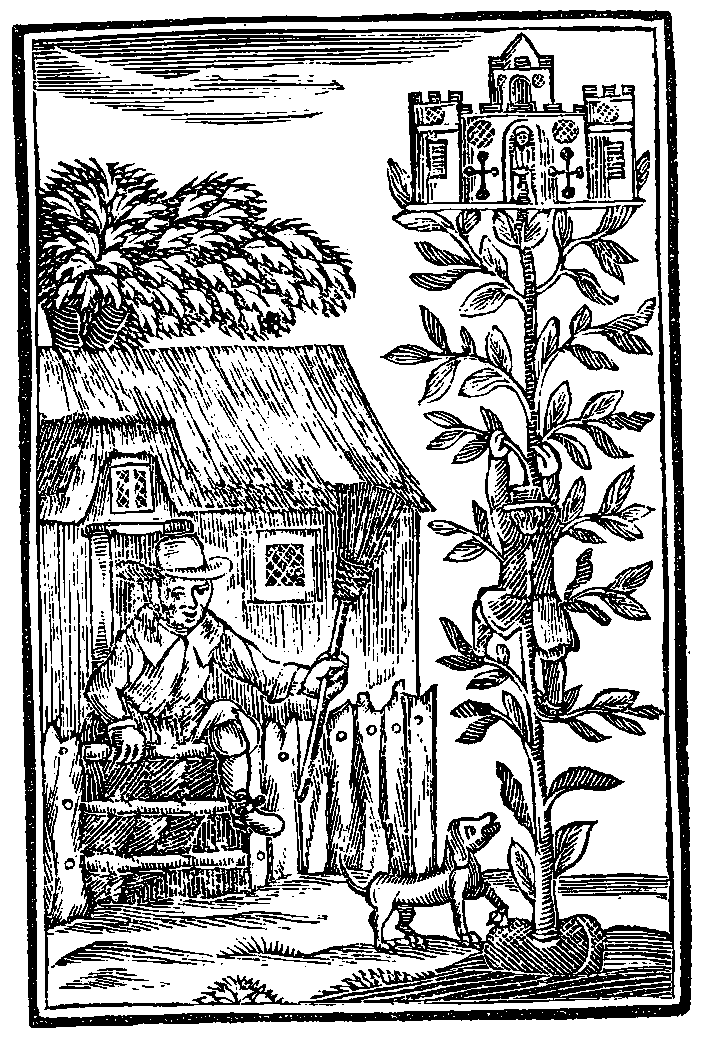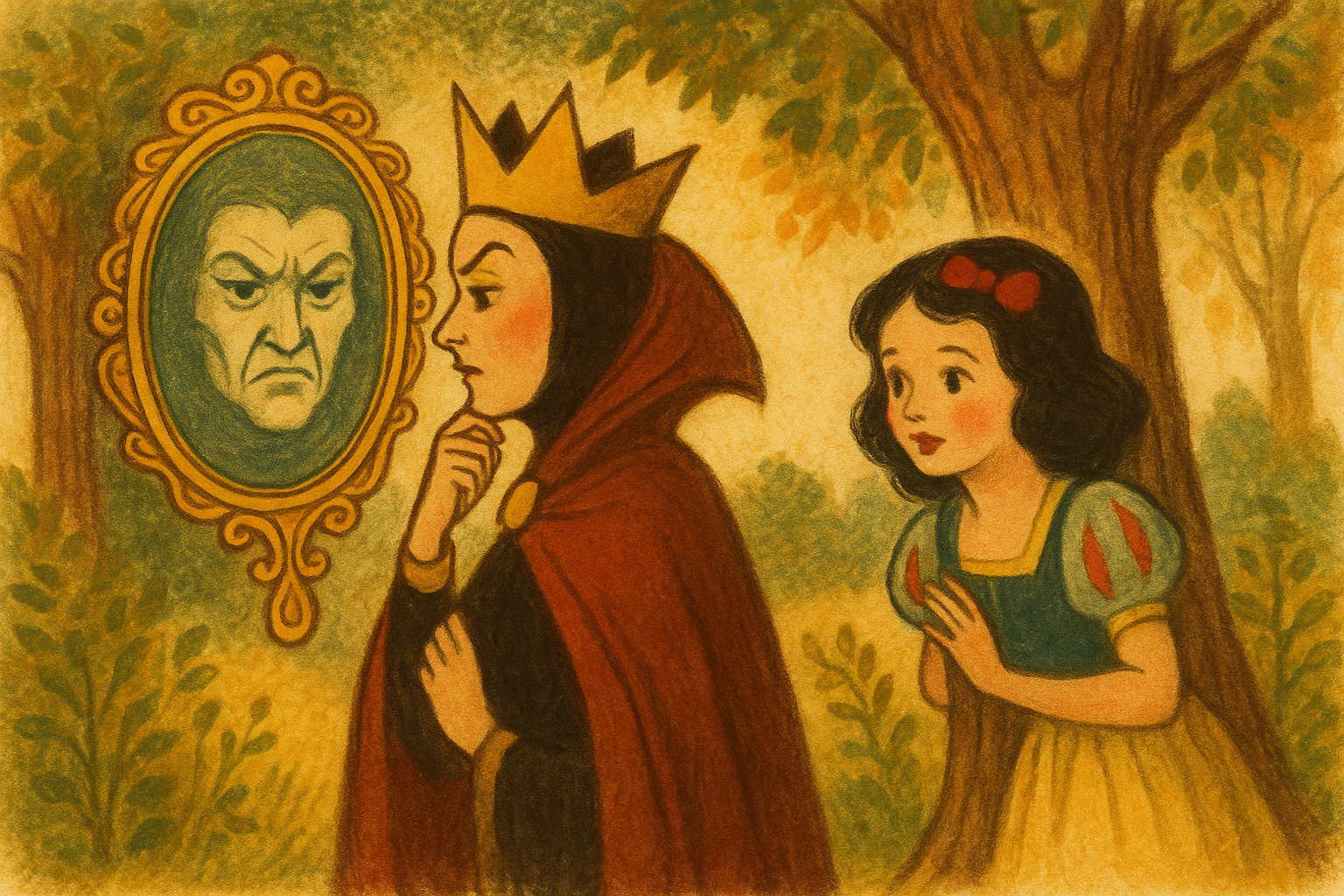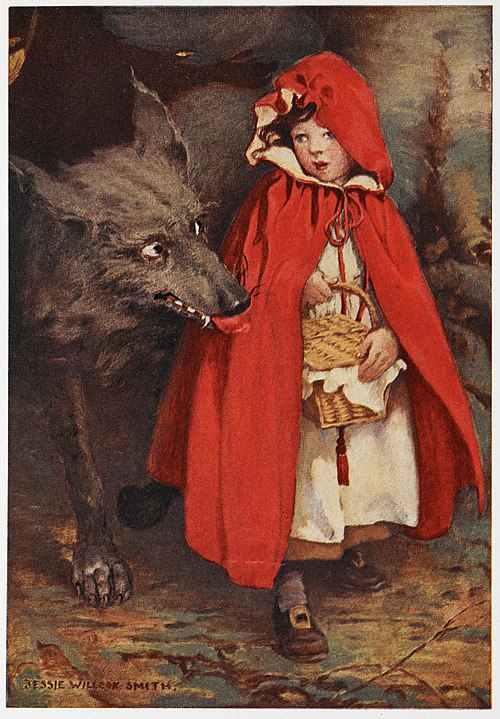
The Original Jack and the Beanstalk
Explore the curious origins of The Story of Jack Spriggins and the Enchanted Bean (1734), the earlie

Little Snow White is a story we’ve heard hundreds of times—a classic battle between innocence and evil, the pure child versus the envious queen. It feels good. But if you read the Grimms’ Little Snow White closely (first published 1812 in Kinder- und Hausmärchen), the queen isn’t the sharpest tool in the shed. She fails at multiple assassination attempts, never confirms a kill, and disguises herself so badly that Walt Disney had to tidy up her act.
In short, the “Evil” Queen really sucks at the evil things. So, who’s the real schemer? I say the mirror.
Scratch what I said earlier about the Evil Queen. Is she really evil? The story talks about her being beautiful, proud, and insecure but aren’t we all those things a little bit? And don’t you dare say all of it but beautiful. But the queen, left alone, might have stayed your friendly neighborhood narcissist. None of the attempted murder because of an obsession with a one-vote beauty contest, but that one vote—the mirror—gives envy a tongue and teeth.
Each morning, she asks the same question:
Mirror, mirror, on the wall,
who in this land is fairest of all?
Like we all do, right?
At first, the mirror tells her that she is. But once Snow White turns the old age of seven, there comes the twist: “Snow White is a thousand times fairer.” That “thousand times” is needling, not neutral. The mirror is egging her on.
And worse—later, after the queen had Snow White chased off and she’s living with the dwarfs, the queen asks the mirror again who is the fairest. Mind you, she never asks where Snow White is, yet the mirror volunteers her hiding place with the seven dwarfs.
You, my queen, are fair; it is true.
But Snow-White, beyond the mountains
With the seven dwarfs,
Is still a thousand times fairer than you.
I would never advocate for dishonesty, but couldn’t the mirror have just told the queen that she was the fairest? After all, she was number two from the sounds of it. Or maybe limit the “land” in consideration to, “Hey, maybe not beyond the mountains? How about just this side?” Then she can be a happy Little Miss Sunshine.
But, no. The mirror turns her envy into a bad hankering for harm, but even then, she’s a nuisance at best when it comes to villainy.
Look at her record:
It’s almost comic. The queen isn’t exactly an evil genius—she’s an incompetent hitwoman. The mirror, meanwhile, keeps prodding her back into the game. Each failure is rewarded with another taunt: “Snow-White…is still a thousand times fairer than you”, as if to say, try again, you ugly fool.
There’s not a lot of argument against the mirror pulling the strings, and it’s just one:
Now is the part where we have to say this is far from the first argument saying that “the mirror was the bad guy the whole time!” That’s not to discredit the argument or us talking about it in our podcast episode, it’s just a bit obvious.
Through the right looking glass, fairy tales often hide the true villain in plain sight. Here, the mirror’s motives seem obscure. Is the mirror evil itself? The queen’s love interest, a man trapped in the mirror (Chris Colfer even runs with this idea in The Wishing Spell, where the mirror is literally a man imprisoned in glass.)? We could even say it’s the mirror from The Snow Queen, made by a devil to show everyone the worst in themselves.
We could say any of those, but the text won’t. What’s clear is this: without the mirror, the queen would never have known of Snow White’s survival. No dressing herself up as an ugly woman (which is hilariously self-defeating in itself) to try to kill a little girl. No dancing at the wedding (if you don’t get this, read or listen to the story). The mirror ensures the cycle of envy never ends.
The Grimms’ tale is usually read as a parable of vanity punished. Yet the mirror transforms it into something darker: weakness untreated can be manipulated into a weapon. The queen can’t rest until the mirror validates her beauty. And when it doesn’t, she destroys herself trying to be more than second best.
We don’t need to stretch to see the relevance. One example: today’s “mirrors” could be social media, tallying likes, views, and filtered reflections. Comparing ourselves to others in a competition of likes and digital acceptance. The almighty algorithm tells not just who we are, but who is “a thousand times” better. We, like the queen, risk dancing ourselves to death in shoes we didn’t forge. All that’s to say: you’re pretty great, who cares about what a pane of glass thinks?
So the next time you hear the name Snow White, remember: the queen may be envious, but that’s only human; the mirror inspired the apple.
Journey deeper into our collection of weekly episodes where folklore meets analysis and chaos reigns supreme in the most delightful way.
Continue your journey through our collection of fairy tale deep dives and folklore insights.

Explore the curious origins of The Story of Jack Spriggins and the Enchanted Bean (1734), the earlie

Fairy tales aren’t just bedtime stories—they’re living history. From Grimm to Basile to Andersen, we